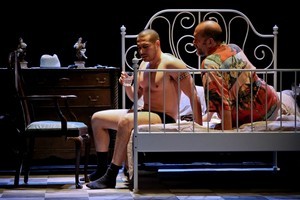SITE GUIDE
SEARCH
REVIEWS
REVIEW ARCHIVES
ADVERTISING AT CURTAINUP
FEATURES
NEWS
Etcetera and
Short Term Listings
LISTINGS
Broadway
Off-Broadway
NYC Restaurants
BOOKS and CDs
OTHER PLACES
Berkshires
London
California
New Jersey
DC
Philadelphia
Elsewhere
QUOTES
TKTS
PLAYWRIGHTS' ALBUMS
LETTERS TO EDITOR
FILM
LINKS
MISCELLANEOUS
Free Updates
Masthead
A CurtainUp Review
Mariquitas
| "Look at all of them holding hands, taking their shirts off, kissing and licking. They think they are free."— Ramon
|

Carlos Valencia and Oscar Hernandez
(photo credit: Sion Fullana) |
Set in 2008, the play presents a pastiche of characters representing various facets of the modern Cuban LGBT community. They coalesce around a bed and breakfast (rendered painterly by Mikiko Suzuki MacAdams) that welcomes gay European sex tourists and their Cuban companions.
Jose Maria (Oscar Hernandez) is one such tourist, a Spaniard who has devoted years and considerable funds to his beloved Tito (Carlos A. Valencia), a married man who is nonetheless devoted to and possibly in love with his elder benefactor.
This particular visit to Havana, we learn, will be Jose Maria's last. He is in the last stages of lung cancer and plans to die in the country where his heart lies. His relationship with Tito is rooted in a financial transaction, but it's still genuine and ultimately touching. As Jose Maria, Hernandez brings a soft and wistful sensibility that is endlessly endearing. His dynamic with Tito is made especially vibrant by its colonial undertones.
The interplay of the sexual and the political is a trademark feature in Machado's work, and it is center stage in Marquitas. With a running time over two hours, Machado has plenty of room with which to explore how various classes make sense of this duality.
There are few easy answers. Even when two disparate generations of hustlers — represented by the older Ricardo (Liam Torres) and the younger Cristobal (talented newcomer Ricardo Davila) — brush up against one another, Machado avoids lazy comparisons about how the country has changed with time. All around, Machado seems to embrace ambiguity.
Marquitas is least stimulating when it abandons this quality and goes for more heavy-handed dissections of the modern climate in Cuba. A character based on the real life LGBT activist Mariela Castro Espin (Begonya Plaza), for instance, serves primarily as a mouthpiece for speeches. Through no fault of the actress, Mariela never quite seems made of flesh and blood.
While the sheer breadth of experiences and ideas in Marquitas is one of its chief joys, its cost is a sometimes meandering plot. Machado bathes his characters in the thematic material, rather than charting a clear path through it. Indeed, a lot of time is spent on stage sitting and chatting over coffees.
Luckily, there's a lot to talk about. And after more than 40 plays, it seems that Machado may never run out of things to say about those areas that interest him. It's a symptom of a mind relentlessly seeking truth, even if the answers remain elusive.
|
Mariquitas Written by Eduardo Machado Directed by Michael Domitrovich Cast: Omar Chagall (Ramon), Matthew d'Amato (Actor), Ricardo Davila (Cristobal), Oscar Hernandez (Jose Maria), Begonaya Plaza (Mariela Castro Espin), Liam Torres (Ricardo), Ed Trucco (Jacinto), Carlos A. Valencia (Tito), Ana Valle (Mercedes) Set Design: Mikiko Suzuki MacAdams Lighting Design: Alexander Bartenieff Sound Design: Elizabeth Rhodes Associate Director: Emma Rosa Went Costume Design: Michael Bevins Running Time: 140 minutes with a 10 minute intermission Theater For The New City, 155 1st Ave., New York, NY 10003, www.theaterforthenewcity.net, (212) 254-1109 From 4/27/13, closing 5/19/2013 Performance times: Thursday - Saturday at 8pm, Sunday at 7pm, additional performances May 8 and May 15 at 8pm. Ticket cost: $15 Reviewed by Jordan G. Teicher at 5/2/2013 performance. |
| REVIEW FEEDBACK Highlight one of the responses below and click "copy" or"CTRL+C"
Paste the highlighted text into the subject line (CTRL+ V): Feel free to add detailed comments in the body of the email. . .also the names and emails of any friends to whom you'd like us to forward a copy of this review. Visit Curtainup's Blog Annex For a feed to reviews and features as they are posted add http://curtainupnewlinks.blogspot.com to your reader Curtainup at Facebook . . . Curtainup at Twitter Subscribe to our FREE email updates: E-mail: esommer@curtainup.comesommer@curtainup.com put SUBSCRIBE CURTAINUP EMAIL UPDATE in the subject line and your full name and email address in the body of the message. If you can spare a minute, tell us how you came to CurtainUp and from what part of the country. |



 Anything Goes Cast Recording
Anything Goes Cast Recording Book of Mormon -CD
Book of Mormon -CD